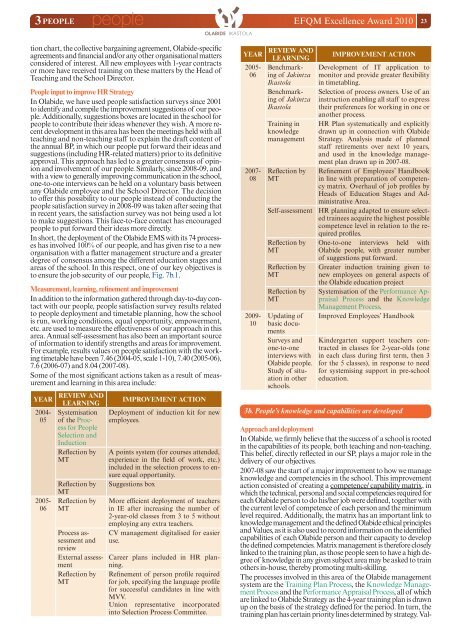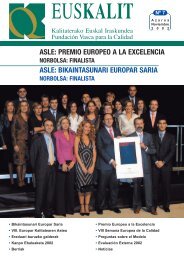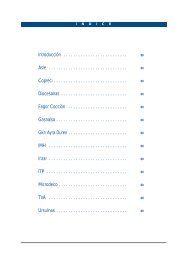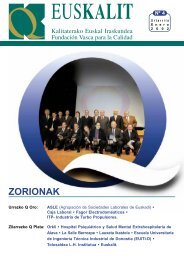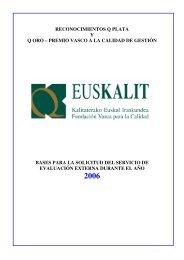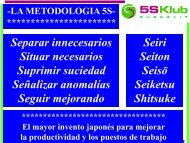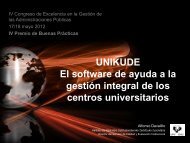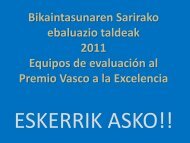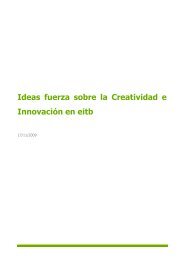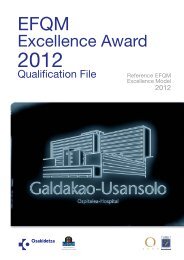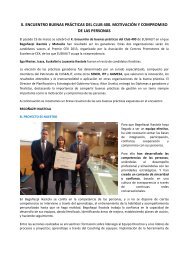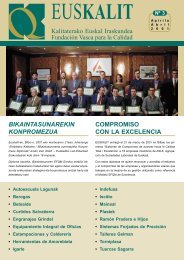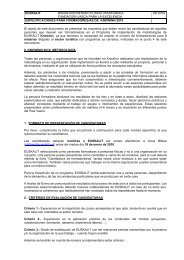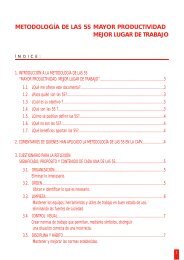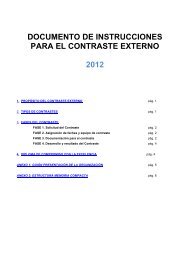Olabide Ikastola - Euskalit
Olabide Ikastola - Euskalit
Olabide Ikastola - Euskalit
You also want an ePaper? Increase the reach of your titles
YUMPU automatically turns print PDFs into web optimized ePapers that Google loves.
people<br />
3 PEOPLE EFQM Excellence Award 2010 23<br />
tion chart, the collective bargaining agreement, <strong>Olabide</strong>-specific<br />
agreements and financial and/or any other organisational matters<br />
considered of interest. All new employees with 1-year contracts<br />
or more have received training on these matters by the Head of<br />
Teaching and the School Director.<br />
People input to improve HR Strategy<br />
In <strong>Olabide</strong>, we have used people satisfaction surveys since 2001<br />
to identify and compile the improvement suggestions of our people.<br />
Additionally, suggestions boxes are located in the school for<br />
people to contribute their ideas whenever they wish. A more recent<br />
development in this area has been the meetings held with all<br />
teaching and non-teaching staff to explain the draft content of<br />
the annual BP, in which our people put forward their ideas and<br />
suggestions (including HR-related matters) prior to its definitive<br />
approval. This approach has led to a greater consensus of opinion<br />
and involvement of our people. Similarly, since 2008-09, and<br />
with a view to generally improving communication in the school,<br />
one-to-one interviews can be held on a voluntary basis between<br />
any <strong>Olabide</strong> employee and the School Director. The decision<br />
to offer this possibility to our people instead of conducting the<br />
people satisfaction survey in 2008-09 was taken after seeing that<br />
in recent years, the satisfaction survey was not being used a lot<br />
to make suggestions. This face-to-face contact has encouraged<br />
people to put forward their ideas more directly.<br />
In short, the deployment of the <strong>Olabide</strong> EMS with its 74 processes<br />
has involved 100% of our people, and has given rise to a new<br />
organisation with a flatter management structure and a greater<br />
degree of consensus among the different education stages and<br />
areas of the school. In this respect, one of our key objectives is<br />
to ensure the job security of our people, Fig. 7b.1.<br />
Measurement, learning, refinement and improvement<br />
In addition to the information gathered through day-to-day contact<br />
with our people, people satisfaction survey results related<br />
to people deployment and timetable planning, how the school<br />
is run, working conditions, equal opportunity, empowerment,<br />
etc. are used to measure the effectiveness of our approach in this<br />
area. Annual self-assessment has also been an important source<br />
of information to identify strengths and areas for improvement.<br />
For example, results values on people satisfaction with the working<br />
timetable have been 7.46 (2004-05, scale 1-10), 7.40 (2005-06),<br />
7.6 (2006-07) and 8.04 (2007-08).<br />
Some of the most significant actions taken as a result of measurement<br />
and learning in this area include:<br />
YEAR<br />
2004-<br />
05<br />
2005-<br />
06<br />
REVIEW AND<br />
LEARNING<br />
Systemisation<br />
of the Process<br />
for People<br />
Selection and<br />
Induction<br />
Reflection by<br />
MT<br />
Reflection by<br />
MT<br />
Reflection by<br />
MT<br />
Process assessment<br />
and<br />
review<br />
External assessment<br />
Reflection by<br />
MT<br />
IMPROVEMENT ACTION<br />
Deployment of induction kit for new<br />
employees.<br />
A points system (for courses attended,<br />
experience in the field of work, etc.)<br />
included in the selection process to ensure<br />
equal opportunity.<br />
Suggestions box<br />
More efficient deployment of teachers<br />
in IE after increasing the number of<br />
2-year-old classes from 3 to 5 without<br />
employing any extra teachers.<br />
CV management digitalised for easier<br />
use.<br />
YEAR<br />
Career plans included in HR planning.<br />
Refinement of person profile required<br />
for job, specifying the language profile<br />
for successful candidates in line with<br />
MVV.<br />
Union representative incorporated<br />
into Selection Process Committee.<br />
2005-<br />
06<br />
2007-<br />
08<br />
2009-<br />
10<br />
REVIEW AND<br />
LEARNING<br />
Benchmarking<br />
of Jakintza<br />
<strong>Ikastola</strong><br />
Benchmarking<br />
of Jakintza<br />
<strong>Ikastola</strong><br />
Training in<br />
knowledge<br />
management<br />
Reflection by<br />
MT<br />
Self-assessment<br />
Reflection by<br />
MT<br />
Reflection by<br />
MT<br />
Reflection by<br />
MT<br />
Updating of<br />
basic documents<br />
Surveys and<br />
one-to-one<br />
interviews with<br />
<strong>Olabide</strong> people.<br />
Study of situation<br />
in other<br />
schools.<br />
IMPROVEMENT ACTION<br />
Development of IT application to<br />
monitor and provide greater flexibility<br />
in timetabling.<br />
Selection of process owners. Use of an<br />
instruction enabling all staff to express<br />
their preferences for working in one or<br />
another process.<br />
HR Plan systematically and explicitly<br />
drawn up in connection with <strong>Olabide</strong><br />
Strategy. Analysis made of planned<br />
staff retirements over next 10 years,<br />
and used in the knowledge management<br />
plan drawn up in 2007-08.<br />
Refinement of Employees’ Handbook<br />
in line with preparation of competency<br />
matrix. Overhaul of job profiles by<br />
Heads of Education Stages and Administrative<br />
Area.<br />
HR planning adapted to ensure selected<br />
trainees acquire the highest possible<br />
competence level in relation to the required<br />
profiles.<br />
One-to-one interviews held with<br />
<strong>Olabide</strong> people, with greater number<br />
of suggestions put forward.<br />
Greater induction training given to<br />
new employees on general aspects of<br />
the <strong>Olabide</strong> education project<br />
Systemisation of the Performance Appraisal<br />
Process and the Knowledge<br />
Management Process.<br />
Improved Employees’ Handbook<br />
Kindergarten support teachers contracted<br />
in classes for 2-year-olds (one<br />
in each class during first term, then 3<br />
for the 5 classes), in response to need<br />
for systemising support in pre-school<br />
education.<br />
3b. People’s knowledge and capabilities are developed<br />
Approach and deployment<br />
In <strong>Olabide</strong>, we firmly believe that the success of a school is rooted<br />
in the capabilities of its people, both teaching and non-teaching.<br />
This belief, directly reflected in our SP, plays a major role in the<br />
delivery of our objectives.<br />
2007-08 saw the start of a major improvement to how we manage<br />
knowledge and competencies in the school. This improvement<br />
action consisted of creating a competence/ capability matrix, in<br />
which the technical, personal and social competencies required for<br />
each <strong>Olabide</strong> person to do his/her job were defined, together with<br />
the current level of competence of each person and the minimum<br />
level required. Additionally, the matrix has an important link to<br />
knowledge management and the defined <strong>Olabide</strong> ethical principles<br />
and Values, as it is also used to record information on the identified<br />
capabilities of each <strong>Olabide</strong> person and their capacity to develop<br />
the defined competencies. Matrix management is therefore closely<br />
linked to the training plan, as those people seen to have a high degree<br />
of knowledge in any given subject area may be asked to train<br />
others in-house, thereby promoting multi-skilling.<br />
The processes involved in this area of the <strong>Olabide</strong> management<br />
system are the Training Plan Process, the Knowledge Management<br />
Process and the Performance Appraisal Process, all of which<br />
are linked to <strong>Olabide</strong> Strategy as the 4-year training plan is drawn<br />
up on the basis of the strategy defined for the period. In turn, the<br />
training plan has certain priority lines determined by strategy. Val-


